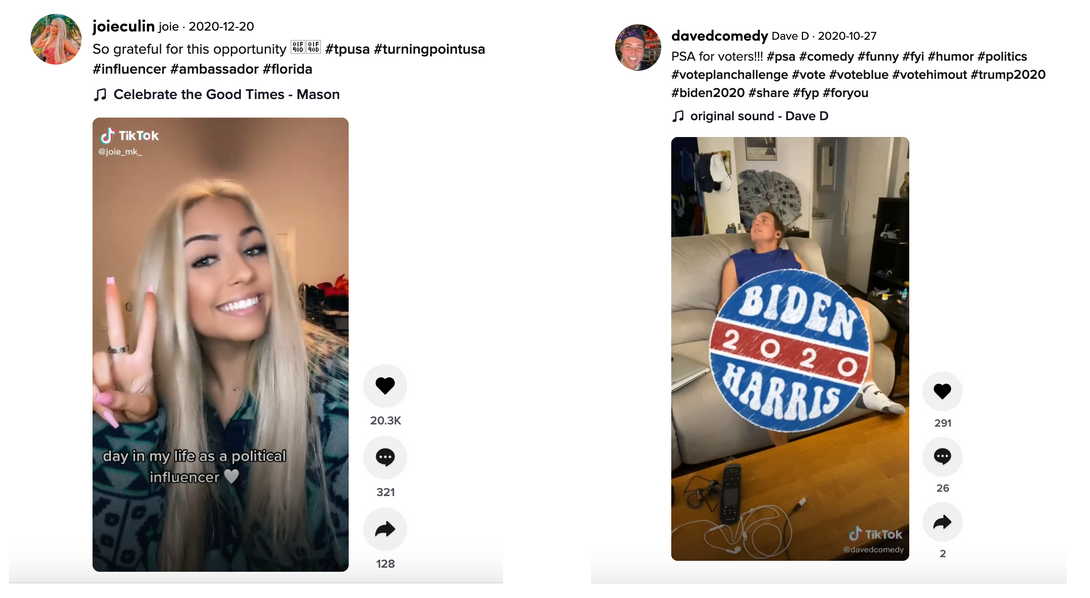
New Mozilla research reveals that loopholes and lax enforcement make TikTok especially vulnerable to abuse by political groups
As internet platforms continue to struggle with misleading and opaque political advertising, TikTok has branded itself as an outlier. The platform claims to have banned all political ads, and positions itself as far more transparent than peers like Facebook and Google.
But new research from Mozilla reveals a different story: Loopholes and lax oversight actually make TikTok vulnerable to misleading political ads and dark money.
“Despite public appearances, TikTok is seriously struggling with ad transparency,” says Brandi Geurkink, Mozilla’s Senior Manager of Advocacy.
Mozilla’s new 20-page report is titled “Th€se Are Not Po£itical Ad$: How Partisan Influencers Are Evading TikTok’s Weak Political Ad Policies.” Mozilla researchers harnessed TikTok’s API and combed through TikTok posts to determine if the platform is enforcing its ad transparency policies. Alongside the research, Mozilla is also launching a public petition urging TikTok to commit to better ad transparency.
Geurkink explains: “Advertising transparency allows people to see who is paying for influence online — a crucial safeguard against manipulation and disinformation. But TikTok’s inconsistent disclosure practices and lax enforcement — paired with zero ad transparency tools or archives — make the platform vulnerable to abuse by political groups and other malicious actors.”
Specifically, Mozilla learned:
______________
[1] TikTok has a major weakness when it comes to influencer advertising.
Advertising on social media platforms is increasingly centered on influencers, yet TikTok’s political advertising “ban” doesn’t seem to be enforced when it comes to this popular form of advertising.
Mozilla’s research revealed that while traditional ads are tagged as such in TikTok’s metadata (“IsAd” = True), influencer ads are not (“IsAd” = False). That’s because influencer ads aren’t placed through TikTok’s advertising system, meaning they face far less oversight and are far more likely to mislead the users who view them.

______________
[2] Political groups and paid influencers are exploiting this weakness.
Our research shows that not only does this weakness exist, but it’s being actively exploited. TikTok influencers across the political spectrum have undisclosed paid relationships — or “dark money” arrangements — with various political organizations in the U.S.
For example, influencers with formal ties to right-leaning political organizations like Turning Point USA, Prager University, and Today is America post political messages without disclosing details of their financial compensation. And influencers with ties to left-leaning political organizations like The 99 Problems do the same. Our research uncovered more than a dozen examples of this.

______________
[3] TikTok is far behind its peers when it comes to political ad transparency.
Other social media platforms like Facebook/Instagram, Snap, and Google/YouTube have public, searchable ad databases — but TikTok does not. Further, Instagram and YouTube have mechanisms for influencers to disclose paid partnerships — but TikTok doesn't seem to.
Mozilla believes Facebook and Google are generally doing a poor job on ad transparency, and so the fact that TikTok can’t match even them is troubling.
______________
In addition to identifying these three problems, Mozilla’s report also urges three interventions to curb this problem. They include:
- Self-disclosure tools: Develop effective self-disclosure mechanisms for creators to disclose paid partnerships or sponsored content.
[Note: We recently learned that TikTok, within the past week, created a branded content policy. It includes mention of a “branded content toggle” to help influencers disclose paid partnerships. We’re currently analyzing the feature to learn more. But we’re cautiously optimistic that this could be a (small) step in the right direction, especially after we raised these issues directly with TikTok two weeks ago in the course of our research.]
- Ad transparency: Invest in implementing robust advertising transparency on the platform that includes paid or sponsored content.
- Policy enforcement: Update its policies and enforcement processes on political advertisements to ensure that they are inclusive of all ways that paid political influence can happen on the platform.
______________
This research is part of Mozilla’s broader work on platform transparency and trustworthy AI. learn more at https://foundation.mozilla.org.
